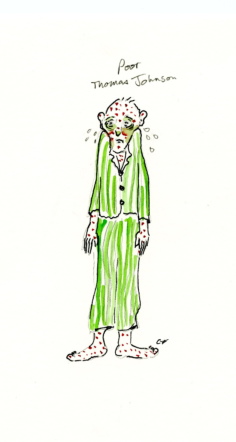Smallpox in Great Ellingham
Amongst the outgoings listed in the Great Ellingham Parish Accounts for the year 1742, are entries for payments of relief by the Overseers of the Parish for three inhabitants of the village:
“For the nursing and keeping William Winter in the time he had the small pox”;
“For the nursing and keeping of the Widow Selth in time she had the smallpox” and “for her funeral charges”;
“For the nursing and keeping of Elizabeth Selth the time she lay of the smallpox“
Illustration by Christine Fuller
Great Ellingham resident Thomas Johnson died of the disease in 1747.
Smallpox Disease
Smallpox was a highly contagious disease. Epidemics spread at speed and then vanished after a few weeks. ‘Smallpox was highly feared‘. ‘About one in three people died from the smallpox‘. Survivors were often left with facial scarring and/or blindness. The disease spread so aggressively that by the end of the eighteenth century, most people had been touched by the disease. The disease affected all classes of society.
Inoculation
Although an early technique for inoculation against the disease (which involved deliberately infecting a person with a less severe form of smallpox which carried risks) was around in the early eighteenth century, it was not until 1798 that Edward Jenner provided scientific proof that exposing people to cowpox prevented smallpox. Jenner convinced the medical profession that the vaccination worked. There was, however, some opposition to vaccination.
Compulsory Vaccination
Compulsory vaccination in Britain against smallpox came with the Vaccination Act of 1853. Vaccination Certificates were issued to those having had the vaccination. However vaccination was still being opposed. In 1898, the law made it possible for parents who were opposed to vaccination, to request exemption certificates for their children.
1898 Case against Harriet List
The report of cases heard at the East Harling Petty Sessions in February 1898 revealed in the Norfolk Chronicle & Norwich Gazette of February 26th, 1898, included the case of Harriet List.
Harriet List, described as the wife of C. C. List of Great Ellingham, was summoned before the Magistrates “to show cause why she had not had her child vaccinated”. Mrs List was ordered to have the vaccination performed within 21 days and to pay eighteen shillings in costs.
I believe this was a smallpox vaccination. The court case was likely brought before the Magistrates prior to the change in the law of 1898.
Sources:
Norfolk Chronicle & Norwich Gazette February 26th, 1898
Willis, Simon. (2013) ‘Smallpox’ How Our Ancestors Died. Pen & Sword Books Ltd., Page numbers 157 to 163
Great Ellingham Town Book 1741-1775. PD609/37. Norfolk Record Office. Microfilm Norfolk Heritage Centre
